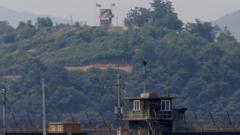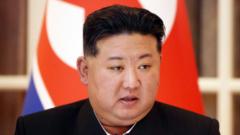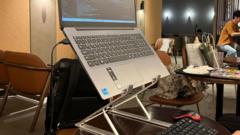**In a recent confrontation, South Korea fired warning shots at North Korean soldiers who briefly crossed the border, as tensions between the two nations continue to rise.**
**Tensions Escalate Along the Korean Peninsula as South Korea Fires Warning Shots at North Korean Troops**

**Tensions Escalate Along the Korean Peninsula as South Korea Fires Warning Shots at North Korean Troops**
**Incidents along the border highlight escalating military tensions between North and South Korea, exacerbated by complex political dynamics.**
South Korea's military has confirmed that it discharged warning shots earlier this week in response to North Korean troops breaching the fragile border between the two nations. This incident has drawn criticism from North Korea, which labeled the action as a "deliberate provocation," warning of an escalation in hostilities. The announcement of these warning shots coincided with new South Korean President Lee Jae Myung's visit to Tokyo and Washington, where he aims to address regional security concerns.
In the wake of Lee's election victory, Pyongyang has intensified its rhetoric, particularly following statements made by Kim Jong Un's sister, who has dismissed Seoul’s appeals for improved relations. The border clash occurred against the backdrop of North Korea's ongoing efforts to solidify its borders, with the Demilitarised Zone (DMZ)—a buffer zone often characterized by sporadic military tension—remaining poorly marked and minimally fortified.
The Joint Chiefs of Staff (JCS) of South Korea reported that North Korean soldiers crossed the military demarcation line around 3:00 PM local time on Tuesday before retreating back north. North Korean media quoted Army Lt Gen Ko Jong Chol alleging that Seoul utilized machine guns to fire over ten warning shots.
"This act serves as a significant prelude that could push the southern border situation toward uncontrollable levels," warned Ko Jong Chol, reflecting the high-stakes environment currently prevailing between the nations. Despite recent efforts by South Korea, including the cessation of loudspeaker propaganda broadcasts deemed an act of war by the North, relations between the Koreas remain strained.
Since the end of the Korean War in 1953, the two Koreas have existed in a state of undeclared war due to the absence of a formal peace treaty, leading to a tense and militarized border that continues to be a flashpoint for conflict.
In the wake of Lee's election victory, Pyongyang has intensified its rhetoric, particularly following statements made by Kim Jong Un's sister, who has dismissed Seoul’s appeals for improved relations. The border clash occurred against the backdrop of North Korea's ongoing efforts to solidify its borders, with the Demilitarised Zone (DMZ)—a buffer zone often characterized by sporadic military tension—remaining poorly marked and minimally fortified.
The Joint Chiefs of Staff (JCS) of South Korea reported that North Korean soldiers crossed the military demarcation line around 3:00 PM local time on Tuesday before retreating back north. North Korean media quoted Army Lt Gen Ko Jong Chol alleging that Seoul utilized machine guns to fire over ten warning shots.
"This act serves as a significant prelude that could push the southern border situation toward uncontrollable levels," warned Ko Jong Chol, reflecting the high-stakes environment currently prevailing between the nations. Despite recent efforts by South Korea, including the cessation of loudspeaker propaganda broadcasts deemed an act of war by the North, relations between the Koreas remain strained.
Since the end of the Korean War in 1953, the two Koreas have existed in a state of undeclared war due to the absence of a formal peace treaty, leading to a tense and militarized border that continues to be a flashpoint for conflict.















